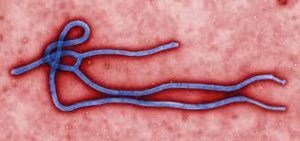Ebola Virus Disease:

An outbreak of Ebola Virus Disease (EVD) has been declared in Uganda following the confirmation of a relatively rare Sudan strain case.
- Ebola Virus Disease (EVD) formerly known as Ebola haemorrhagic fever is a deadly disease with occasional outbreaks that occur mostly on the African continent.
- Ebola virus was first discovered in 1976 near the Ebola River in what is now the Democratic Republic of Congo.
- It most commonly affects people and nonhuman primates (such as monkeys, gorillas, and chimpanzees).
- It is caused by an infection with a group of viruses within the genus Ebolavirus:
- Host: Fruit bats of the Pteropodidae family are natural Ebola virus hosts
- Animal to Human Transmission occurs through close contact with the blood, secretions, organs or other bodily fluids of infected animals such as fruit bats, chimpanzees, gorillas, monkeys, forest antelope or porcupines found ill or dead or in the rainforest.
- Human-to-Human Transmission occurs via direct contact (through broken skin or mucous membranes) with Blood or body fluids of a person who is sick with or has died from Ebola.
- Symptoms may appear anywhere from 2 to 21 days after contact with the virus, with an average of 8 to 10 days which include Fever, Fatigue, Muscle pain, Body weakness, Headache, Sore throat, Vomiting, Diarrhoea, Symptoms of impaired kidney and liver function, in some cases, both internal and external bleeding.




